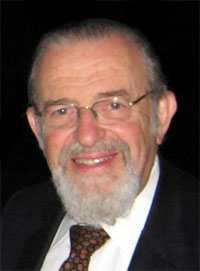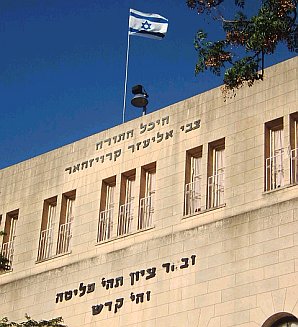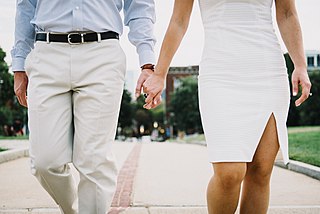This article's lead section may be too short to adequately summarize the key points.(September 2020) |
Jew in the City is an American Orthodox Jewish nonprofit organization.
This article's lead section may be too short to adequately summarize the key points.(September 2020) |
Jew in the City is an American Orthodox Jewish nonprofit organization.
The organization was founded in 2007 by Allison Josephs initially with the mission of breaking down stereotypes about religious Jews by offering a humorous, meaningful look into Orthodox Judaism [1] and creating original social media content in an effort to offer a more nuanced perception of the Orthodox community. In 2013, Jew in the City expanded its programming to former and questioning Haredi Jews after being approached by a former-hasidic couple who said they were fans of the work and were looking to remain religious, even though they had left their community of origin. Based on this need, Jew in the City launched Project Makom which helps former and questioning Haredi Jews find their place in Orthodoxy. [2] Because the people coming to Project Makom had such traumatic pasts, Allison Josephs realized that the worst stories that are featured in the media about the Orthodox community are not actually stereotypes, but are rather the most abusive situations that exist. In a blog post in 2018, she announced that due to this realization, she and her board had decided to update the mission of the organization. Jew in the City's current mission statement is: Jew in the City reverses negative associations about religious Jews by putting forth an approach based on kindness, tolerance, sincerity, and critical thinking and makes engaging and meaningful Orthodox Judaism known and accessible. [1] `
Raised in a Conservative Jewish home, Allison Josephs became a baalat teshuva to Orthodoxy during her teen years. [3] [4] After graduating with a B.A. in Philosophy from Columbia University, she worked in various Jewish outreach programs, including Partners in Torah, where she encountered students with negative misconceptions about Orthodoxy. [5]
She created the Internet personality "Jew in the City" to use online media to reach a wide network of people so that anyone could ask an Orthodox Jew questions and learn about the reality behind the stereotypes.
"Jew in the City" began in 2007 with a website and Facebook, [6] Instagram, [7] Twitter, [8] and YouTube [9] pages filled with articles and videos that give an intimate look into the world of Orthodoxy. While Josephs started off using vignettes from her life to create articles and videos, as the staff has expanded [10] and freelance writers have been brought on, the articles and videos are now a team effort. At times, Josephs responds directly to incidents of perceived bias in media reports about Orthodox Jews. [11] The organization in the City has recently[ when? ] expanded to offer corporate cultural diversity training and consulting services for media outlets . [12]
Jew in the City hosts an annual awards ceremony called “Orthodox Jewish All Stars”, bestowing awards on ten Orthodox Jews who were able to achieve great things while staying true to their religion. [13] [14] In 2013, the awards were sponsored by the Orthodox Union. [15]
The work has been lauded in news outlets including The Wall Street Journal , NPR, The Daily Beast , Yahoo! News, The Jewish Press , The Jewish Week , and Arutz Sheva . [16] In 2012 Josephs was named one of the Top 10 Jewish Influencers in Social Media [17] and in 2013 she was named one of The Jewish Week’s 36 Under 36, a list of influential Jews under age 36. [18]
Jew in the City has been featured in a range of Orthodox publications from centrist [19] to Haredi. [20] Josephs has also been called naïve for her article attempting to bridge the rift between the Reform and Orthodox communities over the controversy about the Women of the Wall. [21]
In 2016 her article and short video on the "skin gap" prompted discussions on websites such as Glossy and Grok Nation , the Nachum Segal radio show, and other venues. [22] [23]

Orthodox Judaism is the collective term for the traditionalist branches of contemporary Judaism. Theologically, it is chiefly defined by regarding the Torah, both Written and Oral, as revealed by God to Moses on Mount Sinai and faithfully transmitted ever since.

Haredi Judaism consists of groups within Orthodox Judaism that are characterized by their strict interpretation of religious sources and their accepted halakha and traditions, in opposition to more accommodating or modern values and practices. Its members are usually referred to as ultra-Orthodox in English; however, the term "ultra-Orthodox" is considered pejorative by many of its adherents, who prefer terms like strictly Orthodox or Haredi. Haredi Jews regard themselves as the most religiously authentic group of Jews, although other movements of Judaism disagree.
The relationships between the various denominations of Judaism are complex and include a range of trends from the conciliatory and welcoming to hostile and antagonistic.
Modern Orthodox Judaism is a movement within Orthodox Judaism that attempts to synthesize Jewish values and the observance of Jewish law with the modern world.

Agudath Israel of America is an American organization that represents Haredi Orthodox Jews. It is loosely affiliated with the international World Agudath Israel. Agudah seeks to meet the needs of the Haredi community, advocates for its religious and civil rights, and services its constituents through charitable, educational, and social service projects across North America.
Jewish religious movements, sometimes called "denominations", include diverse groups within Judaism which have developed among Jews from ancient times. Today in the west, the most prominent divisions are between traditionalist Orthodox movements and modernist movements such as Reform Judaism originating in late 18th century Europe, Conservative originating in 19th century Europe, and other smaller ones.

Norman Lamm was an American Modern Orthodox rabbi, scholar, academic administrator, author, and Jewish community leader. He was the Chancellor of Yeshiva University until he announced his retirement on July 1, 2013.
Religion in Israel is manifested primarily in Judaism, the ethnic religion of the Jewish people. The State of Israel declares itself as a "Jewish and democratic state" and is the only country in the world with a Jewish-majority population. Other faiths in the country include Islam, Christianity and the religion of the Druze people. Religion plays a central role in national and civil life, and almost all Israeli citizens are automatically registered as members of the state's 14 official religious communities, which exercise control over several matters of personal status, especially marriage. These recognized communities are Orthodox Judaism, Islam, the Druze faith, the Catholic Church, Greek Orthodox Church, Syriac Orthodox Church, Armenian Apostolic Church, Anglicanism, and the Baháʼí Faith.
Jewish feminism is a movement that seeks to make the religious, legal, and social status of Jewish women equal to that of Jewish men in Judaism. Feminist movements, with varying approaches and successes, have opened up within all major branches of the Jewish religion.

Avraham Haim Yosef (Avi) haCohen Weiss is an American Open Orthodox ordained rabbi, author, teacher, lecturer, and activist who led the Hebrew Institute of Riverdale in The Bronx, New York until 2015. He is the founder of Yeshivat Chovevei Torah for men and Yeshivat Maharat for women, rabbinical seminaries that are tied to Open Orthodoxy, a breakaway movement that Weiss originated, which is to the left of Modern Orthodox Judaism and to the right of Conservative Judaism. He is co-founder of the International Rabbinic Fellowship, a rabbinical association that is a liberal alternative to the Orthodox Rabbinical Council of America, and founder of the grassroots organization Coalition for Jewish Concerns – Amcha.

Women of the Wall is a multi-denominational Jewish feminist organization based in Israel whose goal is to secure the rights of women to pray at the Western Wall, also called the Kotel, in a fashion that includes singing, reading aloud from the Torah and wearing religious garments. Pew Research Center has identified Israel as one of the countries that place "high" restrictions on religion, and there have been limits placed on non-Orthodox streams of Judaism. One of those restrictions is that the Rabbi of the Western Wall has enforced gender segregation and limitations on religious garb worn by women. When the "Women of the Wall" hold monthly prayer services for women on Rosh Hodesh, they observe gender segregation so that Orthodox members may fully participate. But their use of religious garb, singing and reading from a Torah have upset many members of the Orthodox Jewish community, sparking protests and arrests. In May 2013 a judge ruled that a 2003 Israeli Supreme Court ruling prohibiting women from carrying a Torah or wearing prayer shawls had been misinterpreted and that Women of the Wall prayer gatherings at the wall should not be deemed illegal.
Off the derech is a Yeshiva-English expression used to describe the state of a Jew who has left an Orthodox way of life or community, and whose new lifestyle is secular, non-Jewish, or of a non-Orthodox form of Judaism, as part of a contemporary social phenomenon tied to the Digital, Postmodern and Post-postmodern eras. In its broadest sense it can also include those changing to a milder form of Orthodoxy. Despite the term's pejorative and controversially dichotomic and definitive nature, it has become popular in use among Orthodox people, is found in mainstream literature, and has also been reclaimed by some OTD individuals.

From the founding of political Zionism in the 1890s, Haredi Jewish leaders voiced objections to its secular orientation, and before the establishment of the State of Israel, the vast majority of Haredi Jews were opposed to Zionism, like early Reform Judaism, but with distinct reasoning. This was chiefly due to the concern that secular nationalism would redefine the Jewish nation from a religious community based in their alliance to God for whom adherence to religious laws were "the essence of the nation's task, purpose, and right to exists," to an ethnic group like any other as well as the view that it was forbidden for the Jews to re-constitute Jewish rule in the Land of Israel before the arrival of the Messiah. Those rabbis who did support Jewish resettlement in Palestine in the late 19th century had no intention to conquer Palestine and declare its independence from the rule of the Ottoman Turks, and some preferred that only observant Jews be allowed to settle there.
Hashkafa is the Hebrew term for worldview and guiding philosophy, used almost exclusively within Orthodox Judaism. A hashkafa is a perspective that Orthodox Jews adopt that defines many aspects of their lives. Hashkafa thus plays a crucial role in how these interact with the world around them, and influences individual beliefs about secularity, gender roles, and modernity. In that it guides many practical decisions—where to send children to school, what synagogue to attend, and what community to live in—hashkafa works in conjunction with halakha or Jewish law.

Mishpacha- Jewish Family Weekly is a Haredi weekly magazine package produced by The Mishpacha Group in both English and Hebrew.
In Judaism, especially in Orthodox Judaism, there are a number of settings in which men and women are kept separate in order to conform with various elements of halakha and to prevent men and women from mingling. Other streams of Judaism rarely separate genders any more than secular western society.
Footsteps is a not-for-profit organization based in New York City that provides educational, vocational, and social support to people who have left or want to leave a Haredi or Hasidic Jewish community in the United States.

The "Haredi burqa sect" is a community of Haredi Jews that ordains the full covering of a woman's entire body and face, including her eyes, for the preservation of modesty in public. In effect, the community asserts that a Jewish woman must not expose her bare skin to anyone but her husband and immediate family. The garment in question, known as a shal, is also referred to as a frumka—a portmanteau of the Yiddish-language word frum and the Arabic-language word burqa. The Haredi burqa sect, with an estimated population of several hundred people as of 2011, is primarily concentrated in Israel, and particularly in the Israeli city of Beit Shemesh. These Haredim rarely leave their homes; the married women who do come out in public are accompanied by their daughters, who also don long robes.
Shulem Deen is an American author, essayist, former Skver Hasid, and critic of Hasidic Judaism. He is the author of the memoir All Who Go Do Not Return (2015), and is a regular columnist at The Forward. He is also the founding editor of Unpious, a journal for voices critical of Hasidic lifestyle and beliefs.

The skin gap is the difference in the amount of skin that men and women are expected to show in the same social setting. The term was coined in 2016 by Allison Josephs of Jew in the City. Josephs observed that in Western culture in 2016, women were generally expected to wear less clothing than men. An exception was made for women who did not meet the conventional standard of beauty, for example older or heavyset women; otherwise, there was a great deal of social pressure on women to display their bodies.